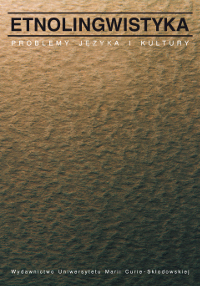OJCZYZNA W POLSKIM I ROSYJSKIM JĘZYKOWYM OBRAZIE ŚWIATA
MOTHERLAND IN THE POLISH AND RUSSIAN LINGUISTIC PICTURES OF THE WORLD
Author(s): Jerzy Bartmiński, Irina SandomirskajaSubject(s): Language studies, Language and Literature Studies, Applied Linguistics
Published by: Wydawnictwo Naukowe Uniwersytetu Marii Curie-Sklodowskiej
Keywords: motherland; Polish Linguistic Worldview; Russian Linguistic Worldview; conceptual sphere; profiling; the lexeme ojczyzna; the lexem rodina; the lexem otechestvo; the leksem otchizna
Summary/Abstract: The authors present the first part of a contrastive Polish-Russian analysis of the concept expressed in English alternatively as homeland, motherland, mother country, or fatherland. They assume that in specific languages there is a variable development, of this European concept, derived from Latin patria. The development is linked with the concept’s position in the ‘conceptual sphere’ (Lichaczew’s term), which contributes to the national (Polish, Russian) linguistic. picture of the world.The Polish lexeme ojczyzna is characterized by a rich multidimensional base content (the spatial, social, cultural, institutional dimensions), profiled at the level of social discourse, which results in expressions like ojczyzna domowa (lit. ‘home motherland’), ojczyzna, lokalna (‘local motherland’), ojczyzna regionalna (‘regional motherland’), mała ojczyzna (‘little motherland’), ojczyzna narodowa (‘national motherland’), or ojczyzna publiczna (‘public motherland’).The Polish word has three Russian counterparts: rodina, otechestvo and otchizna. Rodina refers to a space tamed by people as individuals and as a nation, in otechestvo the institutional state dimension is dominant, whereas otchizna, a borrowing from Polish, refers to national historical and cultural heritage. The latter is the closest Russian equivalent to the Polish ojczyzna, as they are both associated with the Slavonic myth of mother-earth and the prototype of the home as one’s place of origin.The cultural dimension in Polish and the state dimension in Russian are dominant in the semantic field (‘conceptual sphere’) of homeland/motherland, the difference resulting from different histories of the two nations.
Journal: Etnolingwistyka. Problemy Języka I Kultury
- Issue Year: 11/1999
- Issue No: 11
- Page Range: 25-49
- Page Count: 25
- Language: Polish

